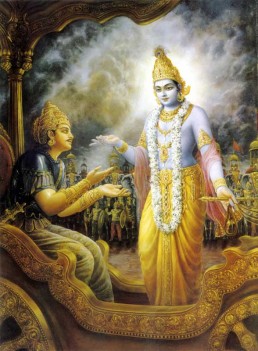Swami Chinmayananda
Swami Chinmayananda Commentary
In the case of the limited ego, its ego-centric actions leave their impressions behind, which ultimately persecute the little ego with their reactions. All ego-centric actions, which are always motivated by selfish desires, leave their ugly foot-prints upon the shores of the mind (Vasanas), while actions which are not ego-motivated leave no trail (Vasanas), as birds leave no foot-prints as they move along in the sky. We can compare an ungrateful son kicking his own father, with an innocent child in a playful mood kicking his own father, with both its legs. A philosopher’s subtle vision is not necessary to understand the difference in texture between these two persons performing the same action — kicking the father. Wherever and whenever an ego-centric action, whipped by selfish desires, is undertaken, gross and painful reactions (Vasanas) must necessarily ensue.
In the case of Eternal animating Its Prakriti, and projecting out “AGAIN AND AGAIN THE MULTITUDE OF BEINGS,” there is neither any attachment (Raga) nor any aversion (Dvesha), and therefore, by this mere happening on the Eternal, the Supreme is not affected: “THESE ACTS DO NOT BIND ME.” It is neither ego-centric nor desire-motivated.
However tragic and murderous the play may be, however tearful and sad the story be, however rainy and stormy the scene be, the white screen in the cinema hall at the end of the play carries neither the marks of the blood spilt, nor the stains of the tears shed, nor the wear and tear of the storm that raged. At the same time, we all know that but for the changeless screen, the story could never have been unravelled through the medium of light and shade. In the same fashion, the ever-pure Infinite, as the Self, becomes the enduring platform for the drama of sorrow that is expressed in the language of plurality, ceaselessly enacted by the infinite number of egos, helplessly repeating the parts ordered by their Vasanas, gathered by them in the past.
The steam in the engine is not punished for the disaster of derailment, nor is the steam complimented when the train reaches its destination in time! Again, neither the disaster nor the successful accomplishment of the journey could ever take place without the steam. The engine without the steam is inert iron assembled in a particular shape, dull and heavy; it is the steam that dynamises and renders it capable of its actions of cruel destruction, or kindly construction, as the case may be. Since the steam in the engine has neither an anxiety to move the train, nor an aversion to move it, the steam is ignored in the achievements of the train, whether good or bad. It is the motive behind the action that determines its reaction.
The Self is the source of all dynamism. It dynamises the mind. Each mind is a bundle of Vasanas. Good Vasanas make the mind sing the song of joy and harmony. Bad Vasanas in the mind make it groan with sobs and tears. The needle in the gramophone is not responsible for the song that the record sings. As the record, so the music. Similarly, the Self is Eternal. It is unmindful of what type of world is projected forth. Nor is It anxious in any sense of the term, to create a better world. Sunlight illumines whatever happens to be there in its light, be it a murder, or be it a martyrdom. Neither the glory of the martyr, nor the crime of the murderer can reach the Sun. The Self, as Pure Consciousness, illumines the Vasanas and lends them the capacity to project out, be it for the damnation of themselves or for their own glorification. “SITTING LIKE ONE INDIFFERENT AND UNATTACHED TO THESE ACTS” the Self revels in the realm of Its lower nature (Prakriti).
WHAT EXACTLY IS THIS STRANGE RELATIONSHIP BETWEEN THE INFINITE AND THE FINITE? THE FINITE ACTS BECAUSE OF THE INFINITE, AND YET THE INFINITE IS SAID TO BE NEUTRAL… HOW?
Adi Sankara Commentary
O Dhananjaya, na ca, nor do; tani, those; karmani, actions-which are the sources of the creation of the multitude of beings unequally; nibadhnanti, bind; mam, Me, who am God. As to that, the Lord states the reason for His not becoming associated with the actions: Asinam, remaining (as I do); udasinavat, like one unconcerned, like some indifferent spectator- for the Self is not subject to any change; and asaktam, unattached; tesu karmasu, to those actions-free from attachment to results, free from the egoism that ‘I do.’ Hence, even int he case of any other person also, the absence of the idea of agentship and the absence of attachment to results are the causes of not getting bound. Otherwise, like the silkworm, a foolish man becomes bound by acitons. This is the idea. There (in th previous two verses) it involves a contradiction to say, ‘Remaining like one unconcerned, I project forth this multitude of beings.’ In order to dispel this doubt the Lord says:
The Bhagavad Gita with the commentary of Sri Sankaracharya – Translated by Alladi Mahadeva Sastry
Holy Geeta – Commentary by Swami Chinmayananda
The Bhagavad Gita by Eknath Easwaran – Best selling translation of the Bhagavad Gita
The Bhagavad Gita – Translation and Commentary by Swami Sivananda
Bhagavad Gita – Translation and Commentary by Bhaktivedanta Swami Prabupadha
Srimad Bhagavad Gita Chapter 9 – Verse 9 – 9.9 na ca mam tani – All Bhagavad Gita (Geeta) Verses in Sanskrit, English, Transliteration, Word Meaning, Translation, Audio, Shankara Bhashya, Adi Sankaracharya Commentary and Links to Videos by Swami Chinmayananda and others – 9-9

